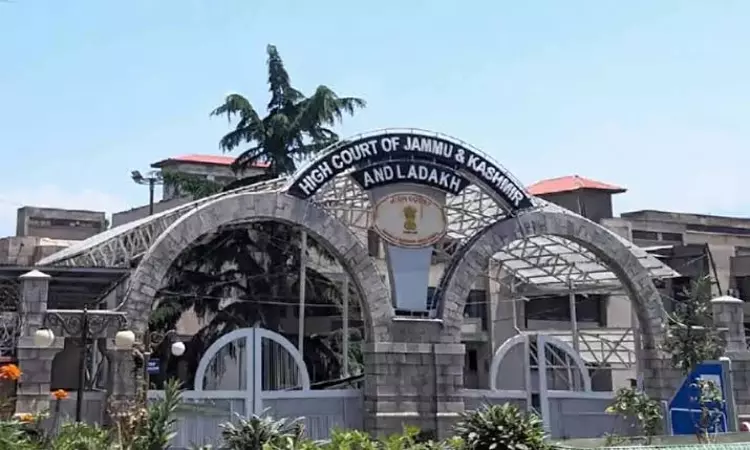- Home
- /
- High Courts
- /
- High Court of J & K and Ladakh
- /
- IT Act | Tax Exemption U/S 10(26)...
IT Act | Tax Exemption U/S 10(26) Not Allowed Without Proof Of Living & Earning In Specified Area: J&K High Court
LIVELAW NEWS NETWORK
27 May 2025 5:40 PM IST
Clarifying the scope of income tax exemption under Section 10(26) of the Income Tax Act, the High Court of Jammu and Kashmir and Ladakh has held that the benefit under this provision is not automatic and can only be claimed when an assessee clearly proves residence in the specified tribal area and demonstrates that the income was actually earned from sources located therein.The Division...
Clarifying the scope of income tax exemption under Section 10(26) of the Income Tax Act, the High Court of Jammu and Kashmir and Ladakh has held that the benefit under this provision is not automatic and can only be claimed when an assessee clearly proves residence in the specified tribal area and demonstrates that the income was actually earned from sources located therein.
The Division Bench comprising Justice Sanjeev Kumar and Justice Sanjay Parihar observed,
“Whether the assessee resides in the specified area and whether the income arises from sources therein are questions of fact to be determined by the Assessing Authority on the basis of cogent evidence”
The bench added,
“In the absence of sufficient proof to establish residence in the specified area during the relevant assessment year and a nexus between the claimed income and that area, the claim for exemption under Section 10(26) cannot be sustained.”
For context, Section 10(26) of the IT Act grants income tax exemption to individuals who belong to a Scheduled Tribe, provided they reside in specified areas such as Arunachal Pradesh, Mizoram, Nagaland, Manipur, Tripura, or the Union Territory of Ladakh.
To qualify for this exemption, three essential conditions must be fulfilled: the person must be a member of a Scheduled Tribe as defined under Article 366(25) of the Constitution; must be residing in one of the specified areas; and the income for which exemption is claimed must arise from a source located within that specified area.
Background:
The case arose from a writ petition filed by one Mehmood Askari, a self-claimed resident of Kargil, Ladakh, seeking to quash an assessment order passed under Section 144 of the Income Tax Act for the Assessment Year 2014–15 and the revisional order passed under Section 264 by the Principal Commissioner of Income Tax, Srinagar.
The Income Tax Department had detected unexplained cash deposits of ₹1.21 crore in Askari's J&K Bank account during the financial year 2013–14. Despite receiving multiple statutory notices including those under Sections 148 and 142(1) the petitioner neither filed his return nor offered any explanation for the deposits. Following an investigation and bank verification, the Assessing Authority issued a show cause notice proposing to treat ₹3.90 crore as undisclosed income, which was later confirmed through an assessment order.
In response, the petitioner claimed that he was exempted from income tax under Section 10(26) by virtue of being a Scheduled Tribe member residing in Ladakh. He submitted a resident certificate issued by the Tehsildar, Kargil, along with a Scheduled Tribe certificate. He also claimed that the income in question arose from conducting religious tours for Ladakhi residents to countries like Syria, Iran, and Iraq.
Court's Findings and Observations:
The Court, however, found serious deficiencies in the petitioner's claims. Firstly, the court noted that during the relevant assessment year (2014–15), the petitioner had not provided any proof of residence in Ladakh. His Permanent Account Number (PAN) application listed a Mumbai address and this address also appeared on tax filings submitted by his brother, who allegedly operated the family's tour and travel business.
The Court noted that the petitioner failed to establish any link between the income and sources located within Ladakh. No documentary evidence such as invoices, booking records, or customer lists was produced to substantiate the claim that the ₹3.90 crore originated from local religious tour operations.
Further, the resident certificate was issued only in 2022 almost a decade after the assessment year and thus could not be relied upon to establish his residence in the Ladakh region during 2013–14 or 2014–15, the court pointed.
“The petitioner could not furnish relevant material/documents to satisfy the conditions explicitly laid down in Section 10(26) of the Act… He also could not sufficiently demonstrate before the Assessing Authority that the amount which was found deposited in his accounts maintained with the J&K Bank, was income derived from source/sources in the specified area”, the court remarked.
The Court reiterated that all three conditions under Section 10(26) must be satisfied, and the burden of proof lies entirely on the assessee. In this case, both the Assessing Authority and the revisional authority found that the petitioner had failed to discharge this burden. The High Court thus found no error or legal infirmity in the concurrent factual findings recorded by both authorities.
The Bench underscored that the High Court, while exercising its writ jurisdiction under Article 226 of the Constitution, does not sit as an appellate forum over factual determinations made by statutory authorities unless they are found to be perverse or illegal. Since the findings in the case were based on documentary evidence or lack thereof the Court found no reason to interfere.
“Having failed to satisfy the three conditions laid down in Section 10(26) of the Act, the petitioner is not entitled to claim exemption of his entire income,” the Court concluded, adding that the matter involved disputed questions of fact best left to the domain of the statutory authorities.
Thus the petition was dismissed finding it devoid of any merit.
APPEARANCES:
Mr. Huzaif Ashraf, Advocate For Petitioner, Mr. T.M Shamsi, DSGI with Mr. Faizan Ahmad, Advocate for R-1. Mr. Umar Rashid, Advocate for R-2.
Case Title: Mehmood Askari Vs Union of India
Citation: 2025 LiveLaw (JKL) 204



